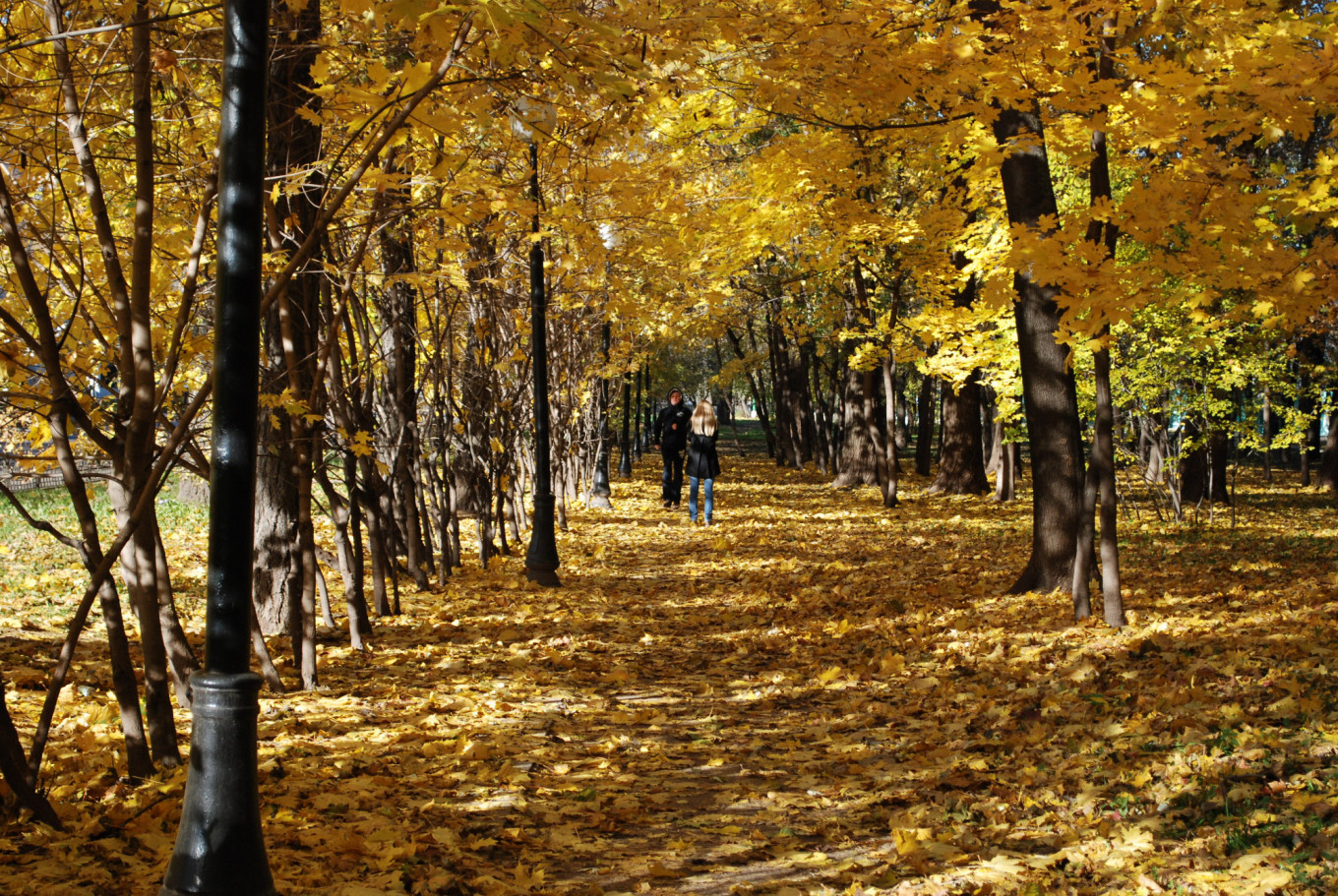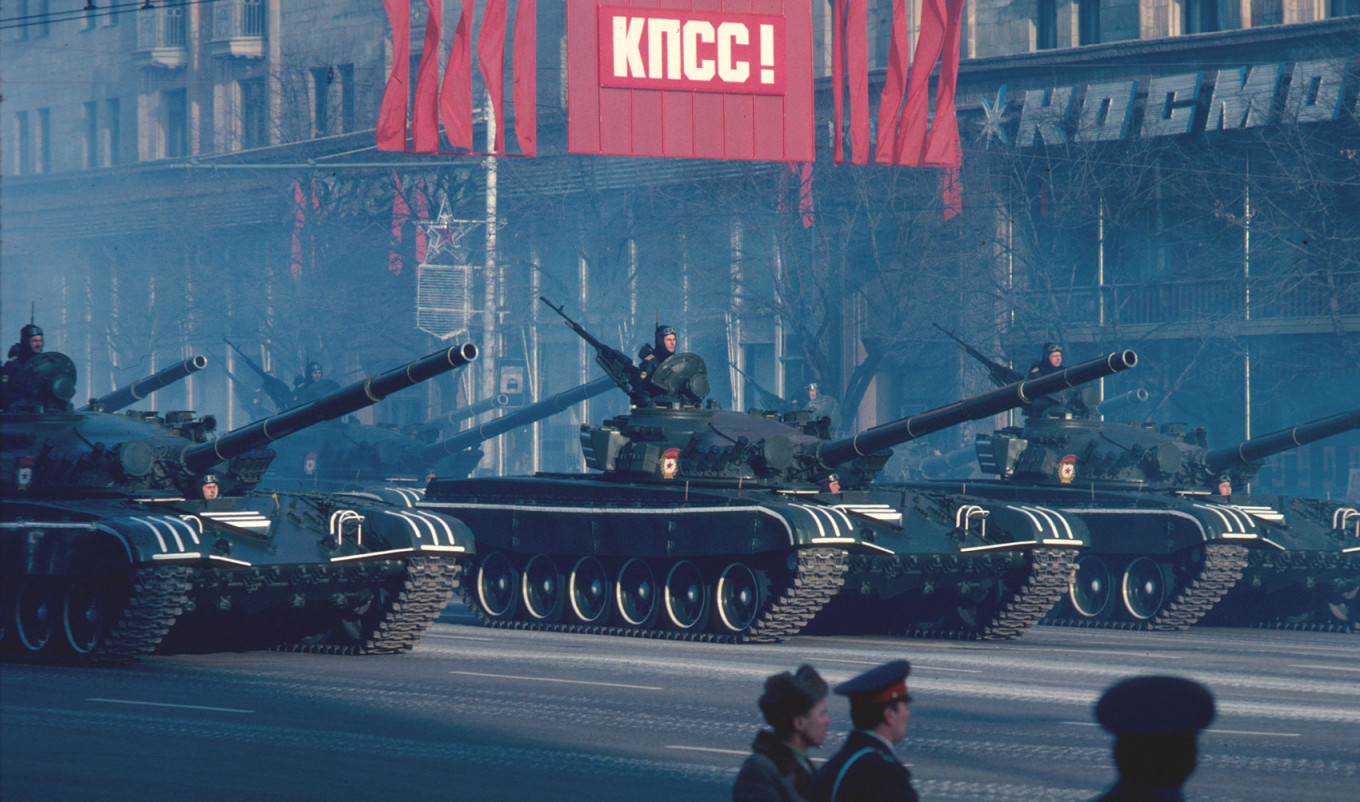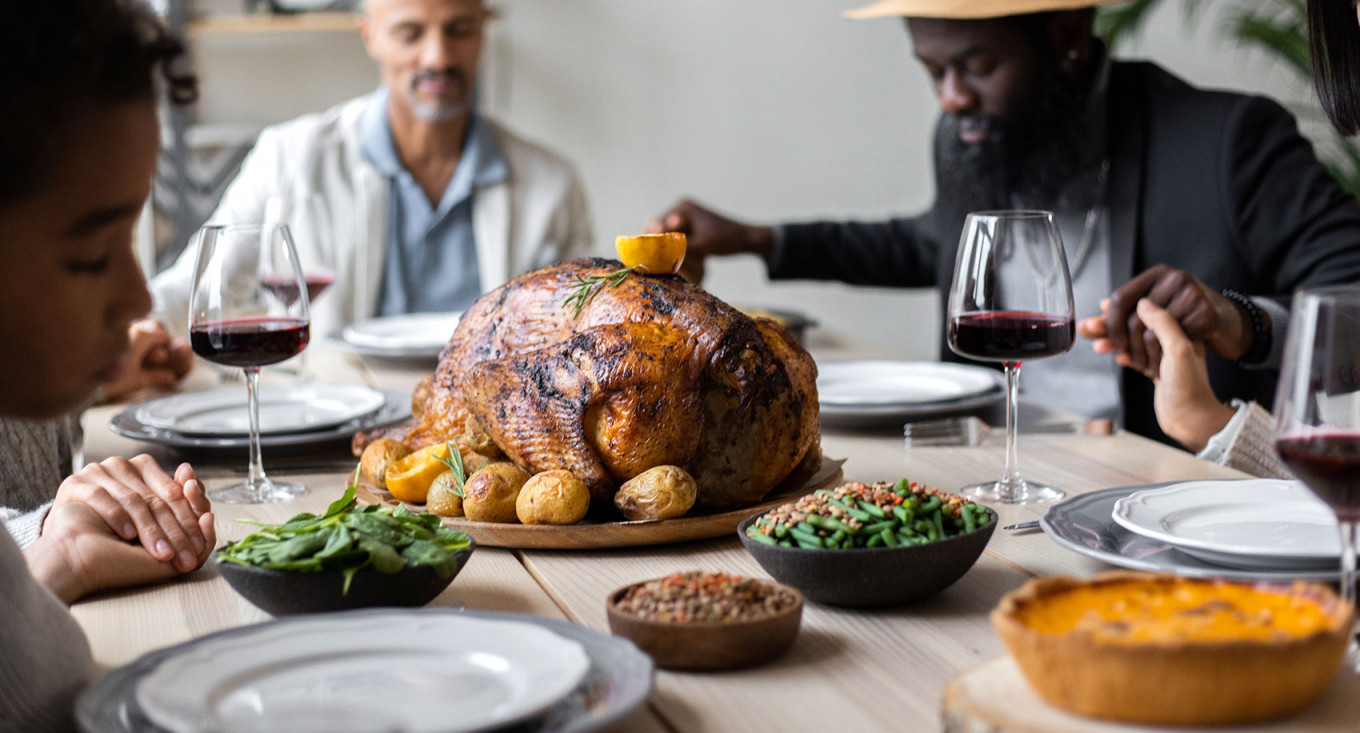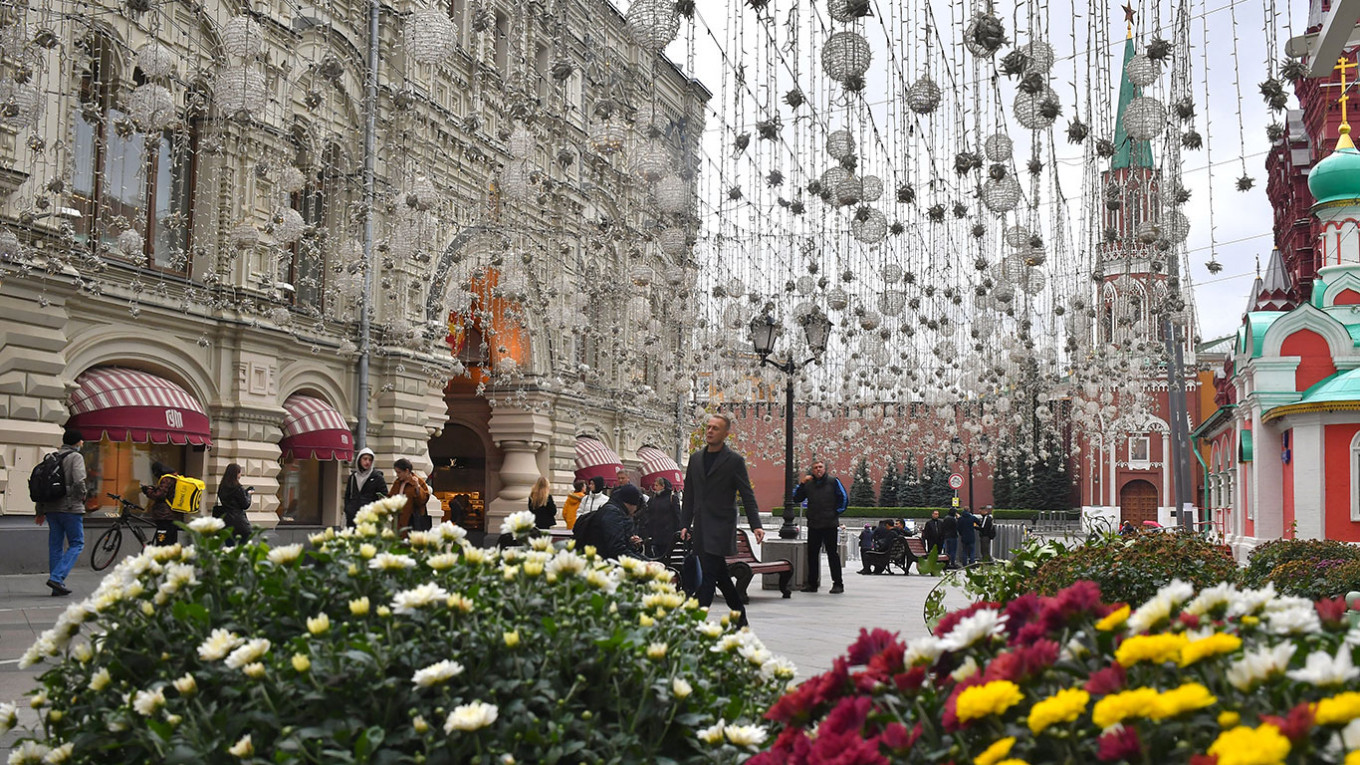Осень: autumn
There are, I’ve heard, places on earth where weather is not a topic of conversation. I’ve heard that in some places a few degrees up or a few degrees down is pretty much the entire range of weather events.
That is not Moscow. Погода (weather) can run your life, determine when and if you go outside, raise or lower the chances of breaking a limb, change your schedule to allow for 15 minutes of dressing before leaving the house, and — let’s not forget — ruin your budget as you fill your closets with five kinds of winter coats, three pairs of boots, and piles of scarves, hats, and that important hidden investment: рейтузы (heavy tights, usually woolen); колготки (tights); кальсоны (long johns); и термальное нижнее бельё (thermal underwear), aka термобельё (thermals) aka тёплое нательное бельё (warm undergarments).
I recall when after the most delightful summer in recent memory, Moscow pulled one of its stunts: it went from a record high on a Saturday (+26) to rain and a definite chill on Sunday (+15) to OMG-where-did-I-put-my-hat on Monday morning (+4).
And do you know the weird thing? Russians like осень (autumn) — at least historically.
The reason is actually quite simple, and all you have to do is to consult a book of folk sayings to find out: Осень - время собирать урожай (Autumn is harvest time). Or you could just consult an etymological dictionary and discover that осень is related to words for harvest, like жатва (to bring in the harvest, from жать, to reap) and урожай (the harvest).
That means: food —lots of it. And lots of food means lots of happy people: Осенью скот жиреет, а человек добреет (In autumn the livestock gets fat and people get nicer). In fact, that means lots of happy creatures: В осень и у кошки и у воробья пиры (In autumn even the cat and sparrow feasts.) So who cares if there is a bit of bad weather? Холоден сентябрь, да сыт (September is cold, but no one goes hungry). In fact, it’s only in the era of imported foodstuffs that people began to like the spring. In the old days, springtime was the worst time of the year: Весна красна, да голодна, осень дождлива, да сытна (Spring is lovely but hungry; autumn is rainy but full of food.)
Over the millennia, the folks who lived in this part of the world came up with fairly precise descriptions of the autumn months. September is all about transition: В сентябре шуба за кафтаном тянется (In September you pull on your fur coat over your summer shift). And the good summer berries are gone: В сентябре одна ягода, и та — горькая рябина (There is just one berry in September — the rowanberry, and it’s bitter). Cold weather is on the way: В сентябре синица просит осень в гости (In September the bluebird invites autumn in.)
October is rainy, muddy and not much fun. Знать осень в октябре по грязи (You know autumn by the mud in October.) Октябрь плачет холодными слезами (October weeps cold tears). Октябрь ни колеса, ни полоза не любит (Neither wheels nor sleigh runners like October). And then, the rain turns into something else: Октябрь — месяц близкой пороши (October is the month close to the first snow flurries.)
November is, without question, the worst month of autumn and possibly the entire year: bare trees, frozen mud, nights getting darker with no snow to brighten things up. Russian folk wisdom concurs, often poetically: Ноябрь — сумерки года (November is the twilight of the year). Ноябрь — ворота зимы (November is the gate to winter). Ноябрьские ночи до снега темны (November nights, before the snow, are dark.)
But there are always slight variations, and you need to pay attention to them, since they predict the winter to come. Some are obvious, even to a city slicker: У зайцев шерсть побелела - зима близко (When a hare’s fur turns white, winter is nigh.) Some are not so obvious. Тёплая осень - к долгой зиме (A warm autumn means a long winter.) Keep your eyes on the willows: Ива рано инеем покрылась — к долгой зиме (If a willow is covered with frost early, winter will be long.) Появление комаров поздней осенью — к мягкой зиме (If mosquitoes appear in late autumn, the winter will be mild.) And: С березы лист не опал — снег ляжет поздно (If the leaves don’t fall from birches, snow will come late.)
There are other folk traditions connected with autumn other than checking out the birch leaves and willows. For example: weddings. The peak wedding season in the old days was during the non-fasting period of winter, between Epiphany and Lent, when there was nothing to do but have a good time: Лето — для старанья, зима — для гулянья (Summer’s when you work, winter’s when you play). But in autumn, the Feast of Intercession on October 14 was another prime wedding time. It marked the end of the harvest work and a celebration of bounty. If there was no groom in sight, on this holiday, named for the protective veil of the Mother of God, unmarried women prayed for a husband in a rather racy way: Покров-батюшка, покрой землю снежком, а меня женишком (Father of the Veil! Cover the earth with snow and cover me with a groom!)
Ah, for the good old days. These days, we only shout: Ура! Стали топить! (Yay! They’ve turned on the heat.)

Хэллоуин: Halloween
Why do you think Russians are getting into Halloween? It’s because a) Halloween goes back to ancient Celtic rituals and everyone knows that Celts and Slavs are related; b) it’s part of the protest movement against the Russian Orthodox Church and state; c) it’s a good excuse to dress up in cool costumes and party.
If you guessed “c”, you might be right. I actually have no idea — I’m just making this stuff up. But judging by my Russian acquaintances, Хэллоуин (sound it out) is not very well understood as a holiday by the Russian masses, but nevertheless heartily embraced as a great opportunity to wear scary, silly or sexy costumes and drink a lot.
I personally support this, since the growing interest in Halloween means that phrases I’ve struggled to render in Russian for decades now have more or less accepted and acceptable translations. The jack o’ lantern — which has a complicated etymology involving an Irish folk hero named Jack, the devil, and imprisonment of the latter by the former in a carved turnip — is usually called a “pumpkin lantern”: тыква-светильник or тыква-фонарик. The phrase “trick or treat” – often mangled almost beyond recognition, including as “trik or trak” – is translated variously, from the rather threatening угости или пожалеешь (give me a treat or you’ll regret it) and кошелок или жизнь (your wallet or your life) to the more linguistically and culturally accurate проделки или угощения (prank or treat) and сладость или гадость (sweet treat or dirty trick).
Of course, Russian kids aren’t dressing up as Spider Man or the Fairy Princess and going from door to door with plastic jack o’ lanterns filled with Твикс (Twix) and Шок (Shock). In Russia Halloween is primarily a young adult holiday (see observations on costumes and alcohol consumption above). Interestingly, some Russian sources interpret the holiday as “countercultural” in the West, perhaps because Russian tourists have been most impressed by the extravagant gay Halloween parades and parties in many cities and didn’t see the grade school parties, suburban trick or treating rituals, and offices filled with vampire computer programmers.
In any case, once you leave the culturally specific domain of Halloween, in Russian it’s easy to talk about the more universal rituals, since the culture has a rich tradition of dressing up in costumes, creepy ghosts and goblins, and scary stories.
Getting dressed in a costume is нарядиться: Кем ты нарядишься на Хэллоуин? (Who are you going as on Halloween?) You can also say надеть костюм: Он надел костюм пирата (He wore a pirate costume.)
You can order costumes online in Moscow, although they tend to be erotic rather than terrifying, with offerings like восхитительная пиратка (the enchanting lady pirate) and карамельная ведьма (caramel-colored witch). You just gotta love capitalism, right?
Scary images might include призрак or привидение (ghost); чёртик (devil), ведьма (witch); вампир/вампирша (vampire, male and female); колдун/колдунья (wizard, male and female); фантом (phantom); or зомби (zombie). You can tell страшилки (ghost stories) – probably about дом с привидениями (haunted house) rather than новый закон об измене (the new law on treason). And you can serve тыквенный пирог (pumpkin pie).
In my set, we celebrate собачий Хэллоуин (doggie Halloween). Last year the canine winner was a black lab wearing a blue safety light on his collar. What was he? Лимузин с мигалкой (limousine with a flashing blue light). Brilliant.

Единство: unity
The main buzz on the street these days is about the November holiday — as in: Напомни мне, пожалуйста – что это за праздник? (Remind me – what’s this holiday?)
Well, it is a long story. It begins with the Великая октябрьская социалистическая революция (Great October Socialist Revolution). This “revolution” (read: coup d’état), which occurred on October 25, 1917, was commonly called Великий Октябрь (Great October) or just Октябрь (October), as in Слава Октябрю! (Glory to October!)
Soon after, the Soviet government switched from the Julian to the Gregorian calendar. Oddly, while the government was busy destroying religion, it kept the church tradition of celebrating holidays on the new date, 13 days after the original event. And so, for 74 years the holiday was celebrated on November 7. This was a bad omen.
I mean, what could you expect from a country that celebrated Great October in November?
By 1992 the USSR was no more, and Great October was an anachronism. But people were used to a holiday in November, and so “в целях смягчения противостояния и примирения различных слоев российского общества” (in order to mitigate the level of confrontation and reconcile various strata of Russian society) the name was changed to День согласия и примирения (the Day of Accord and Reconciliation). There was no official parade on Red Square and no sign of accord or reconciliation.
Not a great holiday.
Apparently, the authorities recognized that and started casting around for a replacement holiday. After all, even if a whole generation had no memory of November 7 parades, it’s a long stretch from June 12 to December 31 without a day off.
Lo and behold, they found a pre-revolutionary state holiday on November 4. True, it was a church holiday, Празднование Казанской иконе Божией Матери (the Commemoration of the Kazan Icon of the Mother of God). But it had a patriotic element – it was held “в память избавления Москвы и России от поляков в 1612 году” (in memory of the deliverance of Moscow and Russia from the Poles in 1612).
The story is that after the Poles invaded Russia during the Time of Troubles (Смутное время), a meat and fish merchant named Kuzma Minin did some fundraising in Nizhny Novgorod for the народное ополчение (voluntary army) and eventually joined up with the commander, Prince Pozharsky. They marched on Moscow. According to one version, on November 4, 1612, holding aloft the miracle-working icon of the Kazan Mother of God, they attacked the invaders in Kitai-gorod and took back the Kremlin the next day. Exit Poles, stage west.
Enter stage east – a few decades and centuries later -- a three-day religious state holiday and a beautiful church for the icon and a grand statue of Minin and Pozharsky on Red Square.
In 2004, the holiday was revived – sort of. It has remained a religious feast day, but now it has been declared День народного единства (Day of National Unity). Minin and Pozharsky are cited for being образец героизма и сплоченности всего народа вне зависимости от происхождения, вероисповедания и положения в обществе (an example of heroism and unity of the entire nation regardless of origin, religious beliefs, or position in society). Russian nationalists don’t buy the bit after “regardless” and celebrate it as a day to get rid of us pesky foreigners.
And the people? As usual, they’ll be either going to Egypt or putting snow tires on their cars.

День благодарения: Thanksgiving
As someone who has celebrated the American holiday of Thanksgiving with my Russian friends in Moscow for decades, I’ve learned that there are a few translation and cultural tricks you need to know to make it a successful cross-cultural experience.
Trick #1: Forget about the fourth Thursday in the month. Even if you have the day off and have somehow managed to shop, clean and cook during the work week, it’s a working day for everyone else. By the time your guests get out of the office and battle the rush-hour crush, it will be 8 p.m. – too late for the full turkey day experience. On the other hand, Thanksgiving Saturday is a lovely Moscow tradition.
Trick #2: Don’t let your friends read about Thanksgiving on Internet. I do not cast aspersions – after all, how many foreigners truly understand Russia Day? But some of the Russian cyber-versions of Thanksgiving seem to confuse Thanksgiving, Christmas and school pageants. One website notes that on Thursday morning “все члены семьи обязательно должны сходить в церковь” (all family members must go to church without fail). Wrong: we’re cooking. Then: В канун праздника благотворительные организации раздают нуждающимся подарки. (On the eve of the holiday, charity organizations give gifts to the needy.) Wrong: we do that a month later. And finally: [они устраивают] парады — в большинстве своем костюмированные — в одеждах 17 века и костюмах индейцев — и веселье (they arrange parades – mostly parades of people wearing 17th century clothes and Indian costumes – and merrymaking). Wrong: we’re too stuffed to parade and make merry. Someone else wrote: К столу подают индейку или гуся, утку. (Turkey, goose or duck is served.) Thanksgiving duck? Perish the thought!
Trick #3: Stick to a simple explanation of the holiday: После первого года жизни в Америке пилигримы хотели поблагодарить Бога за обильный урожай и за помощь местных индейцев. (After the first year in America, the Pilgrims wanted to thank God for their good harvest and for the help of local Indians.)
Trick #4: Tell your guests you’ll serve them традиционный ужин (a traditional dinner). My first attempts to translate the menu did not sound appetizing to Russians. They liked the idea of запеченная индейка (roast turkey), картофельное пюре (mashed potatoes) and подливка (gravy). But начинка из сухариков, овощей и специй (filling made of dried bread, vegetables and spices) was impossible for them to imagine. Клюквенное варенье (cranberry jam) sounded like it should be served over ice cream. Батат (sweet potatoes) conjured up inappropriate images of South American cuisine. And тыквенный пирог (pumpkin pie) suggested a Russian childhood food – каша с тыквой (pumpkin porridge) – mashed up inside some dough.
Trick #5: Don’t under any circumstances tell them: По американской традиции, закусок не будет. (By American tradition, there won’t be any appetizers.) No one will come.
Trick #6: When your Russian guests arrive, ply them with alcohol while you finish the last preparations in the kitchen. They will be nervous: стол без закусок (a table without starters) does not bode well. But when they see the table laden with turkey and all the trimmings, they will relax — and cancel their mental plan to buy frozen pelmeni on the way home.
Trick # 7: When your guests try a dish and ask: Что это такое? (What is this?), add the phrases по-американски (American-style) and специальный (special) to your description. I’ve come to call stuffing специальная хлебная начинка (special bread stuffing). Cranberry sauce is пикантный клюквенный соус по-американски к дичи (American-style, piquant cranberry sauce for poultry). Pumpkin pie is пирог по-американски с начинкой из сладкого тыквенного суфле (American-style pie filled with sweet pumpkin soufflé).
Trick #8: Finally: Будьте благодарны. За всё. (Be grateful. For everything.)
That should do the trick – for Thanksgiving and every day.

A Message from The Moscow Times:
Dear readers,
We are facing unprecedented challenges. Russia's Prosecutor General's Office has designated The Moscow Times as an "undesirable" organization, criminalizing our work and putting our staff at risk of prosecution. This follows our earlier unjust labeling as a "foreign agent."
These actions are direct attempts to silence independent journalism in Russia. The authorities claim our work "discredits the decisions of the Russian leadership." We see things differently: we strive to provide accurate, unbiased reporting on Russia.
We, the journalists of The Moscow Times, refuse to be silenced. But to continue our work, we need your help.
Your support, no matter how small, makes a world of difference. If you can, please support us monthly starting from just $2. It's quick to set up, and every contribution makes a significant impact.
By supporting The Moscow Times, you're defending open, independent journalism in the face of repression. Thank you for standing with us.
Remind me later.








